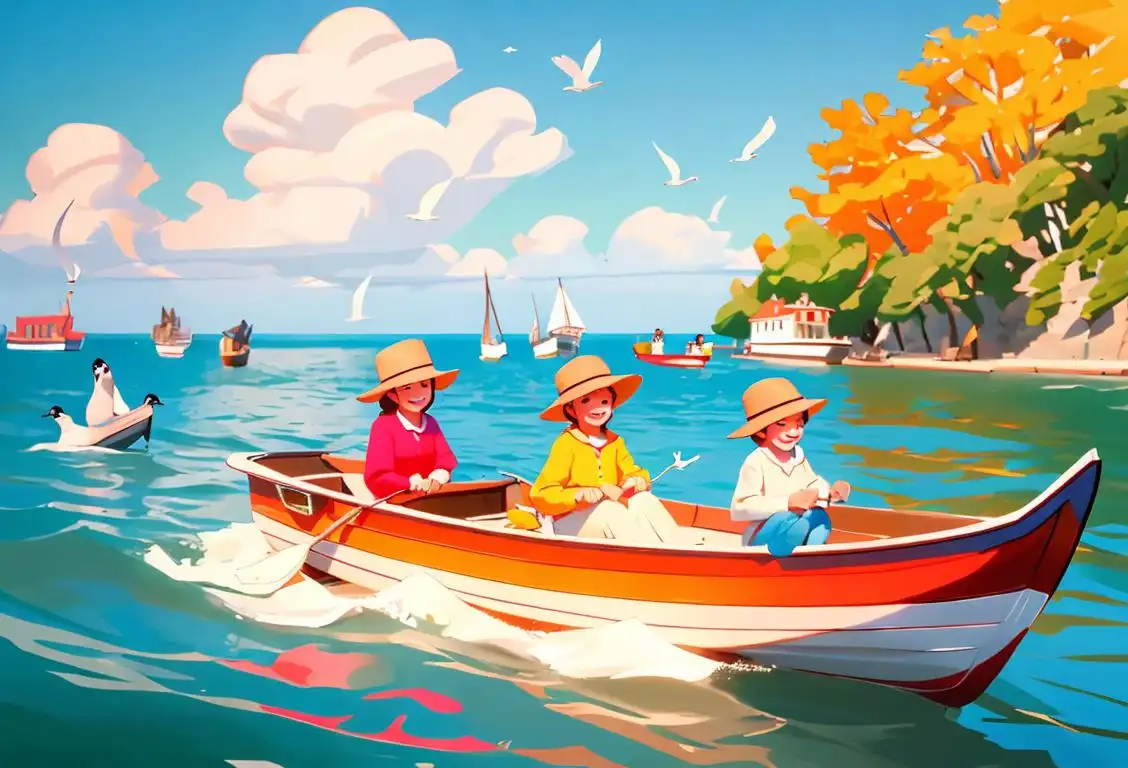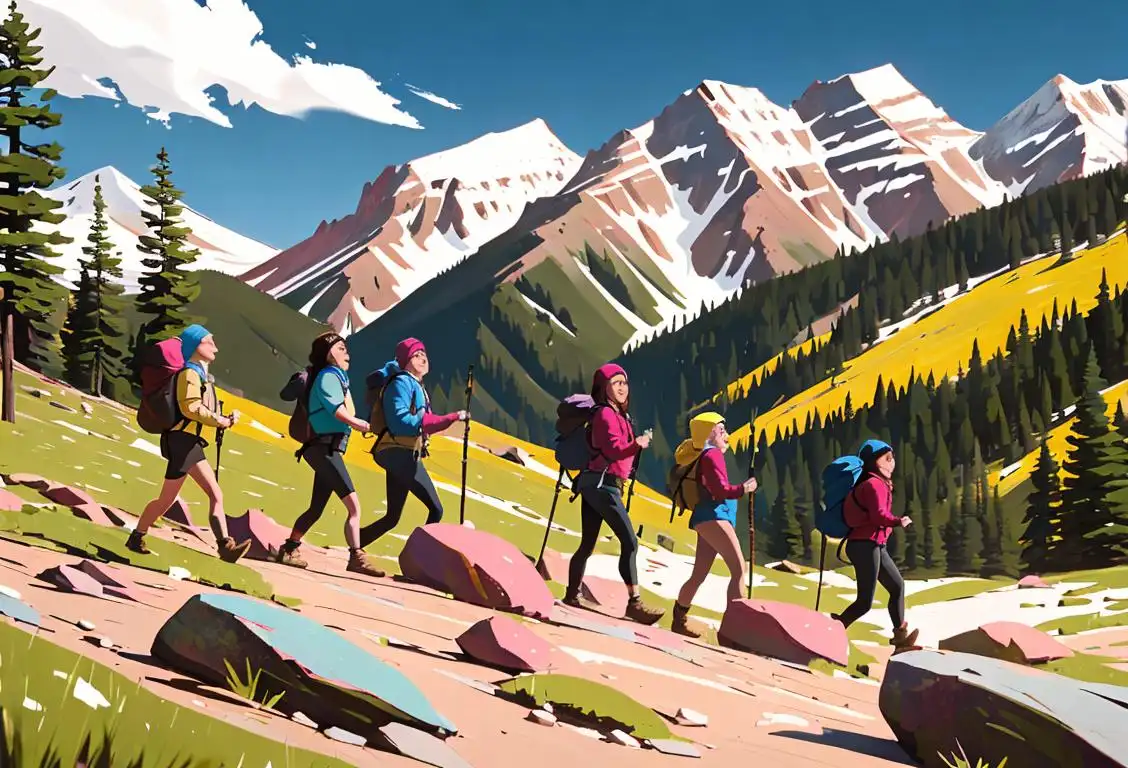National Boating Day

Ahoy, mateys! Get ready to set sail on the sparkling waters because it's National Boating Day! This special day celebrates the joy of boating and all the fantastic adventures that come along with it. So grab your life jackets and join in the nautical fun!
When is Boating Day?
It's national boating day on the 10th July.
The History of National Boating Day
While the exact origins of National Boating Day are a bit murky (much like the deep sea), one thing is for sure: people have been taking to the water for centuries. From ancient civilizations using makeshift rafts to modern-day luxury yachts, the love for boating has always been a part of human history.
In recent years, the internet has played a significant role in popularizing various national days, including National Boating Day. Social media platforms, boating websites, and online communities have come together to create awareness and celebrate the joys of sailing.
Why Boating is Awesome
Boating is more than just a hobby; it's a lifestyle. Whether you're cruising along a serene lake or navigating the open sea, there's something magical about being on a boat. Here are a few reasons why boating is undeniably awesome:
- Boating allows you to escape the hustle and bustle of everyday life and immerse yourself in nature's beauty.
- It's a fun activity for the whole family! From fishing to water skiing, there's something for everyone.
- Boating offers a unique way to explore different destinations and discover hidden gems.
- The boating community is incredibly tight-knit, and you'll make lifelong friends who share the same passion.
Tips for National Boating Day
Ready to celebrate National Boating Day in style? Follow these tips to make the most out of this special day:
- Ensure everyone on board has a properly fitting life jacket. Safety first, always!
- Pack plenty of snacks and refreshments to keep everyone energized and hydrated.
- Don't forget sunscreen and hats to protect yourself from the sun's rays.
- Create a boating playlist filled with your favorite tunes to set the mood.
- Take lots of photos to capture the memorable moments and share them with friends and family.
History behind the term 'Boating'
3000 BCE
First Boats
The history of boating dates back thousands of years. The earliest evidence of boats can be traced back to 3000 BCE, where ancient civilizations like the Egyptians, Mesopotamians, and Phoenicians built basic vessels made of reeds, logs, or animal skins. These primitive boats were used for fishing, transportation, and trade along rivers and coastlines. They paved the way for further advancements in boat design and technology.
3500 BCE
Sailing Innovation
Around 3500 BCE, the Egyptians introduced sails to boats, revolutionizing the way they were propelled. The introduction of sails allowed boats to catch the wind and navigate more efficiently, enabling longer voyages across open waters. This innovation marked a significant milestone in the history of boating, making sailing a primary mode of transportation and exploration.
322 BCE
Ptolemy's Theory of Water Navigation
In 322 BCE, the ancient Greek scholar and mathematician, Ptolemy, developed a theory that revolutionized water navigation. Ptolemy was the first to propose the use of latitude and longitude to determine a ship's position at sea. His theories, later expanded upon by other navigators, made navigation more accurate and reliable, enhancing both safety and efficiency in boating.
1492
Age of Exploration
The 15th century marked the beginning of the Age of Exploration, with Christopher Columbus setting sail in 1492 to search for a western sea route to Asia. This era of exploration led to significant advancements in shipbuilding and navigation techniques. Explorers like Columbus introduced new types of vessels, including caravels and galleons, enabling longer, more daring voyages across the oceans.
1819
First Steam-Powered Vessel
In 1819, the SS Savannah became the first steam-powered vessel to cross the Atlantic Ocean. The introduction of steam power revolutionized boating, replacing traditional sail and oar propulsion systems. Steamboats soon became a common sight, allowing for faster travel and more efficient cargo transportation. This era marked a turning point in the history of boating, inspiring further technological advancements.
1969
Lunar Landing
On July 20, 1969, the Apollo 11 mission achieved the first manned lunar landing, making history and inspiring countless people around the world. While not directly related to boating, the lunar landing stands as a testament to human exploration and achievement. It serves as a reminder of our innate curiosity to explore uncharted territories, whether it be the depths of the ocean or the vastness of space.
Did you know?
Did you know that boating can have a positive impact on your mental health? Being near water has been found to reduce stress and promote relaxation. So not only is boating a blast, but it's also good for your well-being!Tagged
fun family adventure outdoorsFirst identified
10th July 2015Most mentioned on
10th July 2015Total mentions
7Other days
Find A Rainbow Day
Boating Day
Parks Free Day
Parks Across The Us Are Reopening Just In Time For Memorial Day
Parks Will Be Free This Public Lands Day
Naked Hiking Day
Colorado Day
Rv Day
Scooter Day
Winnie The Pooh Day








